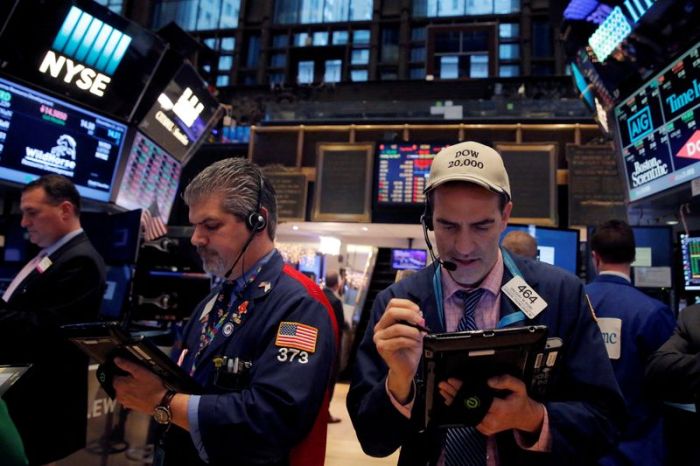NEW YORK (Reuters) – The U.S. dollar index reached a two-week high on Monday on growing worries about Russia-Ukraine tensions and as St. Louis Federal Reserve President James Bullard reiterated calls for faster U.S. Federal Reserve interest rate hikes.
The index briefly jumped further in afternoon trading after Ukraine President Volodymyr Zelenskiy urged Ukrainians to fly the country’s flags from buildings and sing the national anthem in unison on Feb. 16, a date some Western media have cited as the possible start of a Russian invasion.
The comments spooked investors, who have fled to the safe-haven dollar amid the escalating geopolitical problem, but the dollar index quickly came off those highs.
Ukrainian officials said Zelenskiy was not predicting an attack on that date, but instead responding with skepticism to foreign media reports.
United Nations Secretary-General Antonio Guterres said he was deeply worried about “increased speculation” about a military conflict, and urged world leaders to step up diplomacy to calm the situation.
Washington had said Russia could invade Ukraine “any day now,” and British Prime Minister Boris Johnson on Monday called the situation “very, very dangerous.”
“The big driver clearly is tensions in the Ukraine. Markets are in risk-off mode across the board. Implied volatilities are up,” said Karl Schamotta, chief market strategist at Cambridge Global Payments in Toronto.
The dollar index was last up 0.4% at 96.3090 after reaching 96.4410, its highest since Feb. 1.
The dollar was little changed against the Japanese yen at 115.57, while the dollar was also nearly flat against the Swiss franc at 0.9252 franc..
Earlier Monday, Bullard also said four strong inflation reports in a row warranted action and that the central bank needed to “ratify” market expectations of its upcoming moves.
Last week’s stronger-than-expected U.S. consumer price index report has driven speculation the Fed might raise rates by a full 50 basis points in March.
“Clearly we still have the after shocks of last week’s inflation report and St. Louis Fed president Bullard’s comments,” Schamotta said. “We have traders positioning for a front-loaded tightening cycle.”
The move into safe-haven assets has overshadowed expectations for monetary policy tightening from the European Central Bank. ECB President Christine Lagarde also recently reiterated that any policy action would be gradual.
Against the dollar, the euro was down 0.4% at $1.1301.
The Fed will release its January meeting minutes on Wednesday.
In cryptocurrencies, bitcoin was up 0.2% at around $42,169.
========================================================
Currency bid prices at 4:27PM (2127 GMT)
Description RIC Last U.S. Close Pct Change YTD Pct High Bid Low Bid
Previous Change
Session
Dollar index
96.3090 95.9330 +0.40% 0.675% +96.4410 +95.9040
Euro/Dollar
$1.1301 $1.1346 -0.40% +0.00% +$1.1369 +$1.1280
Dollar/Yen
115.5700 115.5200 +0.04% +0.00% +115.7450 +115.0200
Euro/Yen
130.61 130.97 -0.27% +0.00% +131.3900 +130.0500
Dollar/Swiss
0.9252 0.9255 -0.02% +1.45% +0.9272 +0.9239
Sterling/Dollar
$1.3528 $1.3561 -0.26% +0.01% +$1.3571 +$1.3495
Dollar/Canadian
1.2723 1.2739 -0.10% +0.00% +1.2784 +1.2720
Aussie/Dollar
$0.7126 $0.7137 -0.17% +0.00% +$0.7150 +$0.7087
Euro/Swiss
1.0457 1.0502 -0.43% +0.00% +1.0514 +1.0438
Euro/Sterling
0.8351 0.8369 -0.22% +0.00% +0.8386 +0.8347
NZ
Dollar/Dollar $0.6614 $0.6653 -0.66% +0.00% +$0.6649 +$0.6593
Dollar/Norway
8.8885 8.8700 +0.29% +0.00% +8.9490 +8.8695
Euro/Norway
10.0451 10.0607 -0.16% +0.00% +10.1251 +10.0321
Dollar/Sweden
9.3846 9.3273 +0.12% +0.00% +9.4499 +9.3030
Euro/Sweden
10.6044 10.5918 +0.12% +3.62% +10.6917 +10.5743
(Additional reporting by Stefano Rebaudo, Editing by Andrew Heavens, Alexander Smith and Richard Chang)
























